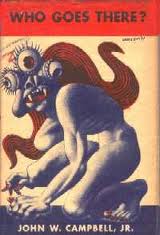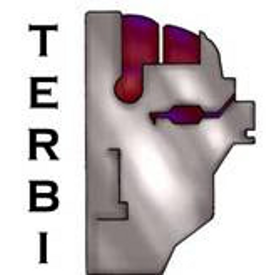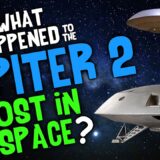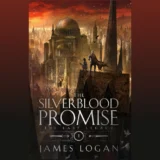John W. Campbell, aka – Don A Stuart, wrote for Astounding Science-Fiction. His work Who Goes There? was voted the best science fiction novella EVER. Okay, slip of the tongue. ONE of the best. Sorry. I guess I just saw RED when I first misread the article. My first thought was” Hey! You can’t do that.” I mean, wouldn’t you hate it if some award did that? Took away everyone’s shot at being the best storyteller ever?
If you haven’t read Who Goes There?, you may have seen the film adaptations at one point. It was known, in 1951, as The Thing From Another World; and, in both 1982 and 2011, it was titled as The Thing. I don’t usually go in for horror, but this is a suspenseful story. If there’s one thing you can count on, a good story will find a way to reinvent itself, to remake itself over and over.

Photo source: WIKI
My childish fears would often give my Dad a laugh. When the family would stay up together to watch a late night horror movie, starring Vincent Price, I would, inevitably, leap out of my seat and run. I’d usually hide in the bedroom. Often I’d burrow deep into the closet. With that deep dark, I couldn’t stay put. I would get nervous as I started to hear things that weren’t there. Couldn’t be there. Why take a chance? So I would creep back out of the darkness, up the hallway, toward those … sounds. Edging into view of the living room, I’d to peek past the door jamb, hoping that nothing horrible was happening. I’d pray that I could rejoin the others for safety in numbers. But there was never any safety. One look at the TV screen and an ice pick of fear would run down my spine. I could hear my Dad chuckling, thinking my distress was funny. This would make me furious. It obviously was not funny.
Maybe that’s why I prefer to read books. Books provide instantaneous control over the volume and the pace. Simply put the book down. Some ideas demand contemplation. Books allow that. They encourage the measured thought. The pace of Who Goes There? remains suspenseful because of the measured thought. The characters must work together to discover how this creature –this mystic of shadows, a soul-swapper that can steal your colleagues from you– has become the killer in their midst. But how to stop this monster? This alien overhears all your plans. You can’t sneak up on this monster. Before you know it, you’ve been murdered. You become a costume to be worn as a disguise against your co-workers in a game of death and sorrow.
This plot reminds me of a high school game called Wink! Deal out hearts to participants, but slip in a ringer…the Ace of Spades, who’s the killer. Everybody picks a card and the killing spree begins. The killer winks an eye at you to kill, hoping there’s no witnesses. After the killer flirts with you, count to ten, then fall out of your chair and die horribly. Everyone else must guess who the killer is before they wink out of existence. Each death quickens the pace and redefines the plot. The game is all about survival.
Hostile aliens, obviously, make for perfect enemies. Since they aren’t from your neighborhood, you can quickly abandon your humanity and start shooting at the evil in your midst. No time for niceties, like asking the strange alien where it’s from … not while it’s trying to murder you. In the fight, flight, or adapt test, I recommend mobility. Staying on the move, and ducking, can buy you time while you look for The Ultimate Weapon.

The essential feature in Campbell’s novel, The Ultimate Weapon, is the search for an ultimate weapon while under attack from hostile aliens. Earthlings attempt to buy time, while defending themselves. The aliens, from the giant star Mira, come from a stellar system of hardship and trial. They desire what the fortunate Earthlings possess and they arrive with blood in their eyes. The battle is joined and the two species engage in a deadly dance of tactics and probing attacks. Modifying their technology, and adapting with new tactics, the Earthlings search for salvation, continuing research on their defensive shields and offensive weapons.
Meanwhile, the invading force of Mirans establishes several footholds thoughout Sol system. Earth’s colonies evacuate and outlying defenses crumble into rubble as Earth’s final moments approach. Hope arrives with a research breakthrough. New applications, derived from the Laws of Uncertainty, turns the tide of war. This mastery of Uncertainty pushes the invaders back to their home system where they are forced to surrender. Campbell wisely has the Earthlings negotiate a peace treaty that is beneficial to both species. An interstellar alliance is born.

Invaders From The Infinite continues diplomatic interactions with Earth’s galactic neighbors from Ortol. The Ortolians arrive on Earth and immediately beg for assistance against aggressors. They have made first contact with a species invading from another galaxy and hope that Earthlings have some means to deter them. The threat is verified through telepathic means and Earthlings quickly agree. Revealing their earlier contact with Mirans, and another near neighbor, Earthlings formulate plans with the Ortolians against these hostile aliens known as the Thessians.
Even as Earthlings arrive with the Ortolian emmissaries in their home system of Ortol, the Thessians are already wreaking havoc by destroying Ortolian cities. The Earthlings succesfully repel the Thessians invaders. This engagement reveals some of the abilities their enemies possess and the team of allied researchers proceed to another stellar neighbor, discovering they, too, have been invaded by an even more powerful force of Thessians.
Eventually, the Thessians, who have thoroughly disenchanted the inhabitants of several worlds, find themelves facing a union of interstellar systems. Blunted, but not defeated, the Thessians continue their aggression as the interstellar union plots to engineer their defeat. The allies pool their research and their technology. As each species in this alliance contributes their unique experiences, their collaboration reveals new avenues of research in physics and chemistry.
I believe it’s these expositions, about developing research and new applications from that research, during a time of war, that is the fulcrum upon which a reader is moved. It’s what makes the reading so compelling. It also seasons these novels with the flavor of true science fiction. While you are reading, you are thinking: “Well, c’mon now. You expect me to believe that?” Before your suspension of disbelief can evaporate, Campbell switches from the action to the thought processes of “This is how we solve that little problem.” It’s what turns a reader into a fan. It’s satisfying to know that there’s some logic underlying the action.
Hostile aliens have, in some sense, magical powers. These powers are usually buried early in the plot before any exposition reveals their foundation in science or logic. But they also have magical powers as a writing technique. Their hostility drives the pace of the story. You can’t reason with them, so you better take action. It’s like a breathing cycle, an in-and-out of life force, as hostile aliens make you both think and flinch.
First, there’s the writing’s technical exposition, appealing to your logic centers, that sends a tingly sensation through your brain. Suddenly, the hostile alien’s aggressive behavior forces your emotional state to squirt adrenaline into your blood stream. Your belly muscles clinch. Your eyes dilate. It’s fight or flight. So what do you do? You adapt.
Campbell’s stories may have hostile aliens, but he’s also committed to building alliances with aliens whenever possible. It’s the human thing to do. And that element is a theme many SF writers keep coming back to. No matter how hostile the alien, humans have an obligation to engage in diplomacy if there’s any chance that it will work.
We have come to accept this premise as an unconscious axiom of the human condition. Even if it’s unspoken, an assumption exists that human beings have an obligatiojn to be a good neighbor, to get along with our fellow galactic citizens and build an interstellar community. In our hearts, we know that human evolution demands this of us. It’s idealistic, but collectively we imagine a point in our future evolution where poverty will vanish and everyone will be a valued member of society, contributing to the betterment of all humankind and the galactic community.
Perhaps we owe something to hostile aliens. Our human evolution may, in fact, depend upon our ability to become more human, even if it takes some hostile aliens to drag us there, kicking and screaming the whole way.
You can find free Ebooks by John W Campbell at The Project Gutenberg.
Check out the Campbell Awards.











Funny to read this here, but I have been reading Campbell's Arcot, Wade,and Morey stories – of which INVADERS FROM THE INFINITE is one – to review them in Robert Jennings' fanzine FADEAWAY. Your conclusions here are similar to what I've come to: that conflict results in technological gain, mainly due to humanity's ability to be resilient and innovative in times of stress. Campbell also builds on the common assumption, based on historical observation, that war creates opportunities for scientific advancement. In his stories, the mental gymnastics of problem solving are perhaps more important than the actual conflicts themselves. Sure, the wily, creative humans always come out on top as they defeat those nasty hostile aliens, but Campbell also extends the olive branch; that human and alien civilizations can coexist in peace, much like nations have done so here on Earth (best example here, Europe and North America, plus many Asian countries) following the Second World War and the end of the Cold War. In the end, that is probably what Campbell envisions with, as you state, a peaceful and productive "galactic community."
The stress of war driving scientific innovation and the pursuit of diplomacy are consistent themes in SF story development and resolution, but the Star Trek franchises, in particular, embrace them as axioms. Watch any episode of those franchises and the odds are fifty-fifty that the teleplay will employ one or the other theme, sometimes both.
I don't think themes like these sprout up in a day. Different writers may end up tweaking these concepts, pushing these themes to evolve, but in the end, they are rather recognizable elements in numerous plots. The protagonist, despite desparate odds, maintains an inner humanity.
I find it interesting that Campbell, in Invaders From The Infinite, seems to create an air of casual acceptance to the building of interstellar diplomatic alliances. It is understood that good neighbors will readily come to the common defense of the galactic community.
He expends great effort in exposition upon scientific progress, on invention, to gain tactical advantage. But he is ever ready embrace diplomacy, to allow that if intelligent beings want peace, it is only natural that they form alliances. That theme is harder to execute, but it's a core human value. Obviously I agree with that, but I find it interesting that there is usually less exposition on that theme. It is often a given.
I am always fascinated with hostile aliens. Understanding alien motivations almost always reveals more about being human. Aliens force us into conflicts, but without them, we would never know how human we really are.